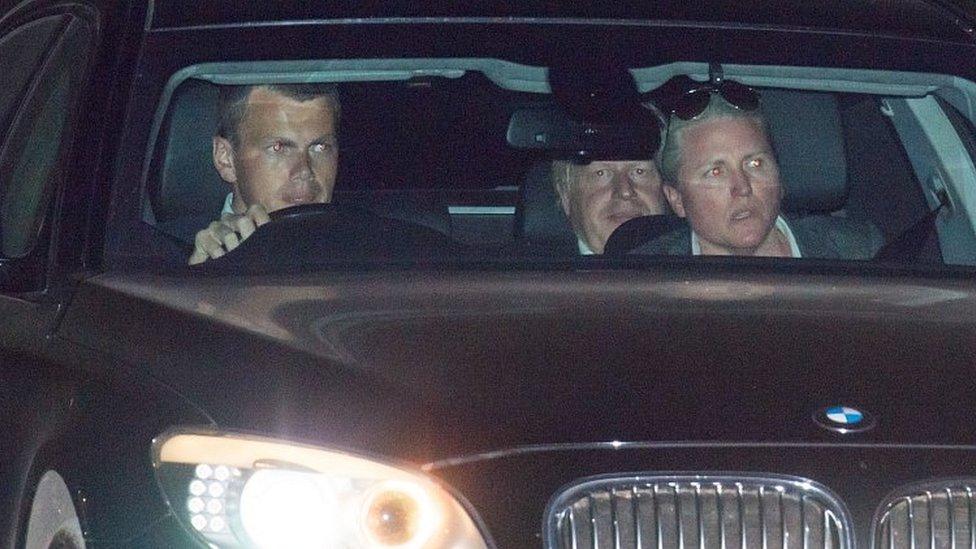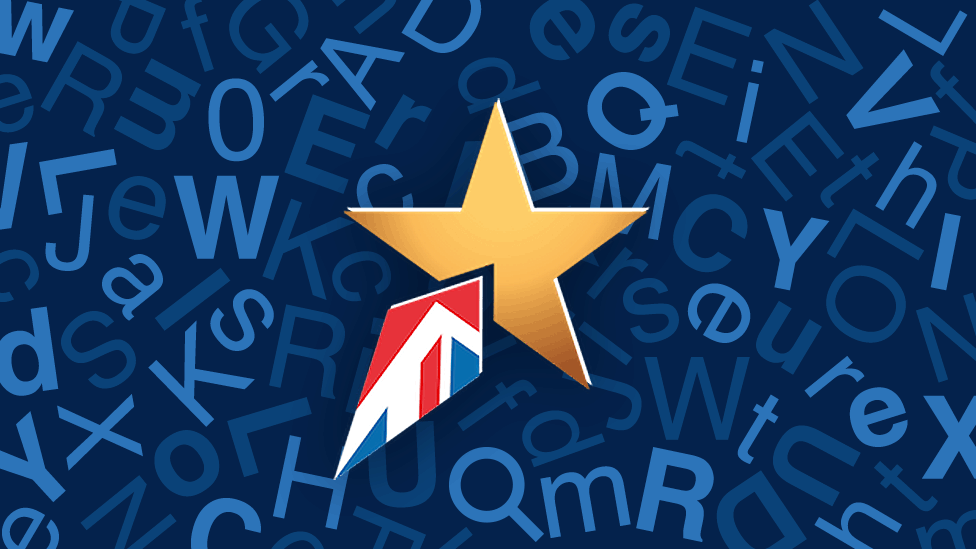Brexit: Boris Johnson 'criticised' Theresa May's plan for deal with EU
- Published
Theresa May: "We will bring an end to free movement"
Boris Johnson strongly criticised Theresa May's plan for the UK's future relationship with the EU before agreeing to back it at Friday's cabinet meeting, the BBC understands.
The prime minister held the Brexit meeting at Chequers, where the cabinet agreed to support her favoured option.
Mr Johnson used colourful language as he made the argument Mrs May's plan would leave the UK as a "vassal state".
Labour said Mrs May's customs plan was a "fudge" and would soon "unravel".
At Friday's summit, ministers signed up to a plan to create a free trade area for industrial and agricultural goods with the bloc, based on a "common rule book".
They also backed what could amount to a "combined customs territory".
Environment Secretary Michael Gove told the BBC on Sunday that the deal was a compromise that would lead to a "proper Brexit". But he said the UK should be prepared to walk away if the EU was not willing to negotiate.
At Friday's get-together, Mr Johnson told colleagues the plan could be a "serious inhibitor to free trade", according to BBC political correspondent Nick Eardley.
The foreign secretary backed the proposals at Chequers despite claiming that defending the plans was like "polishing a turd".
An ally of the prime minister said Mr Johnson's comments were made in a humorous style, and after a dinner Mr Johnson had then paid a rousing tribute to the prime minister.

Boris Johnson has signed up to the plan but made his misgivings known
After ministers signed up to the deal late on Friday night, Mrs May said the time for ministers to air their concerns in public was over and collective cabinet responsibility had been re-instated.
Friends of Mr Johnson say he is staying in the cabinet to "make the argument for Brexiteers".
'I am a realist'
Mr Gove said the plan "honoured" the 2016 referendum vote as the UK would be outside EU institutions and structures, telling the BBC it "achieved all of the things we campaigned for".
Although the UK would sign up to EU rules on goods, he said the UK would have the "sovereign ability" to diverge where it wanted and that this autonomy would apply across a "a swathe of the economy".
'Be generous or we'll walk away' - Gove's warning to EU
Asked by the BBC's Andrew Marr if the proposed deal was everything he had hoped for, Mr Gove replied: "No, but I am a realist" - adding that cabinet unity was important.
If the EU did not show flexibility, the UK may have to "contemplate walking away without a deal", he added.
"No-one wants to walk away now because we are in the middle of a negotiation," he said. "What we need to do is to be able to walk away in March 2019."
'Pretence and charade'
Tory Brexiteers are uneasy about many aspects of the plan, warning the UK will have to follow EU laws and European Court of Justice rulings and not be able to develop an "effective international trade policy".
Conservative MP Andrew Bridgen called the PM's pledges a "a pretence and charade intended to dupe the electorate".
Writing in the Mail on Sunday, Mr Bridgen, external said the "time has come for a new [Conservative] leader" which he believes should be Brexiteer Jacob Rees-Mogg.
Former Conservative leader Iain Duncan Smith, external told the Sunday Telegraph if the public perceive Mrs May's plan as "continued membership" of the customs union and single market for goods, the government "will suffer the consequences at the next election".
Theresa May: "This is a serious, workable proposal"
But Mrs May told the Sunday Times: "The only challenge that needs to be made now is to the European Union to get serious about this, to come round the table and discuss it with us."
She said her plan was a "serious, workable proposal" and when people voted to leave the EU, "they wanted to take control of our money, our laws and our borders and that's exactly what we will do".
'Think again'
Shadow Brexit secretary Sir Keir Starmer said proposals to avoid customs checks by differentiating between UK and EU-bound goods, in terms of what tariffs should be paid, were "a bureaucratic nightmare".
"This has got fudge written all over it," he told Andrew Marr. "She (Theresa May) has not met our demands. It is going to unravel and she will have to think again."
He urged Mrs May to put her customs proposals to a vote in Parliament in a week's time, suggesting Labour's alternative plan for a comprehensive customs union had the backing of the majority of MPs.
The prime minister gathered her 26 cabinet ministers together at her country residence to resolve differences over the shape of the UK's relations with the EU and break the current deadlock with the EU.
The main details from the Chequers statement, external, to be incorporated in a white paper next week, are:
The UK would accept continuing "harmonisation" with EU rules on the trade in goods, covering only those necessary to ensure frictionless trade
Parliament would have the final say over how these rules are incorporated into UK law, retaining the right to refuse to do so
There will be different arrangements for trade in services, including financial products, with greater "regulatory flexibility" and "strong reciprocal arrangements"
Freedom of movement as it stands will come to an end but a "mobility framework" will ensure UK and EU citizens can continue to travel to each other's territories and apply for study and work
A new customs arrangement will be phased in, with the goal of "a combined customs territory"
The UK will be able to control its own tariffs and develop an independent trade policy
The jurisdiction of the European Court of Justice will end but the UK will pay regard to its decisions in areas where common rules are in force
The Observer reported that more than 100 entrepreneurs and business leaders, external regard Mrs May's plan as "unworkable" and "costly and bureaucratic".
- Published9 July 2018
- Published11 December 2020
